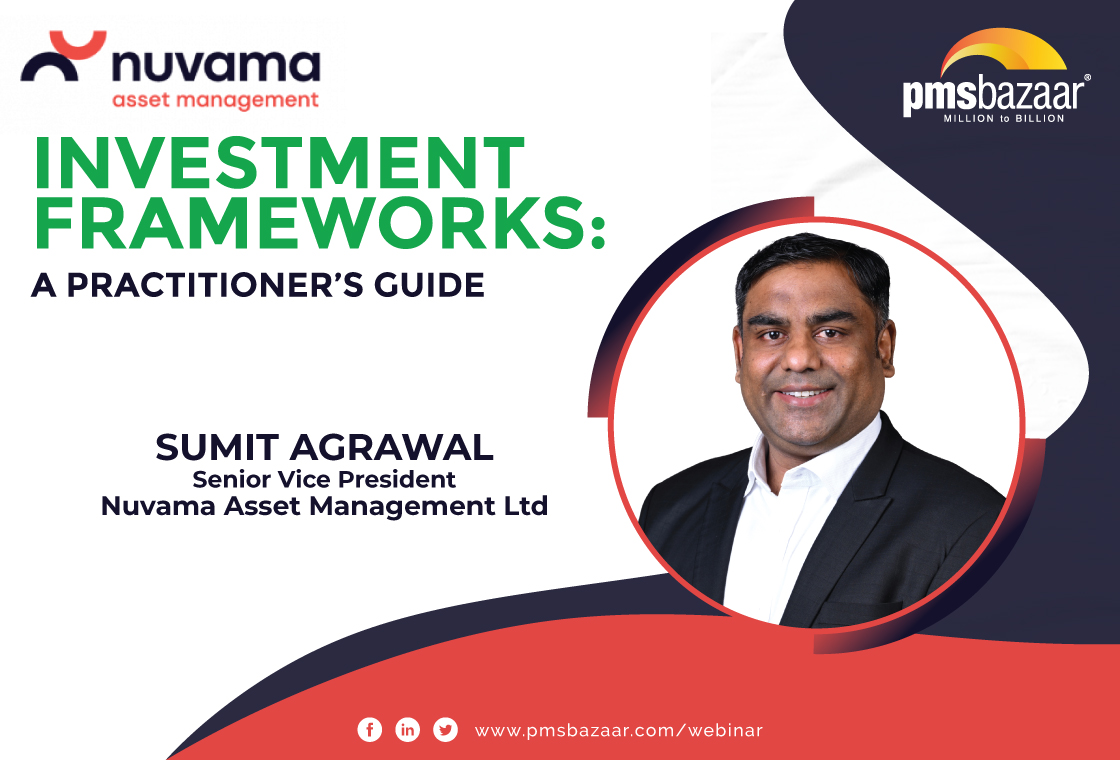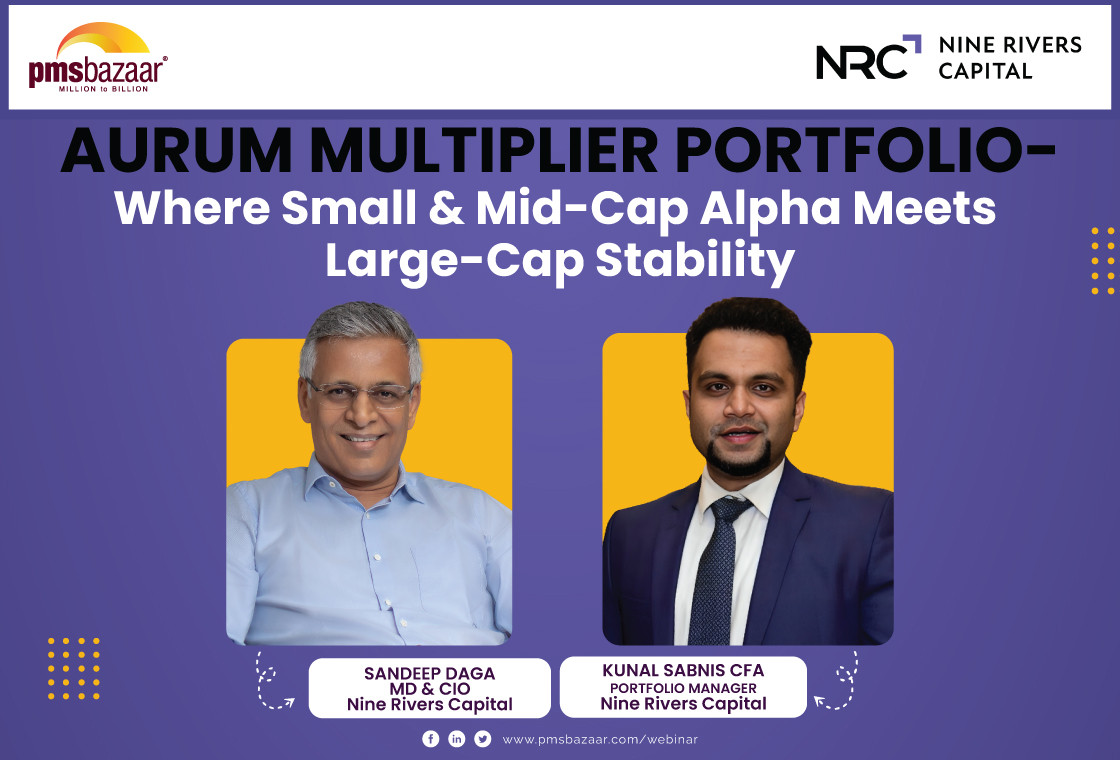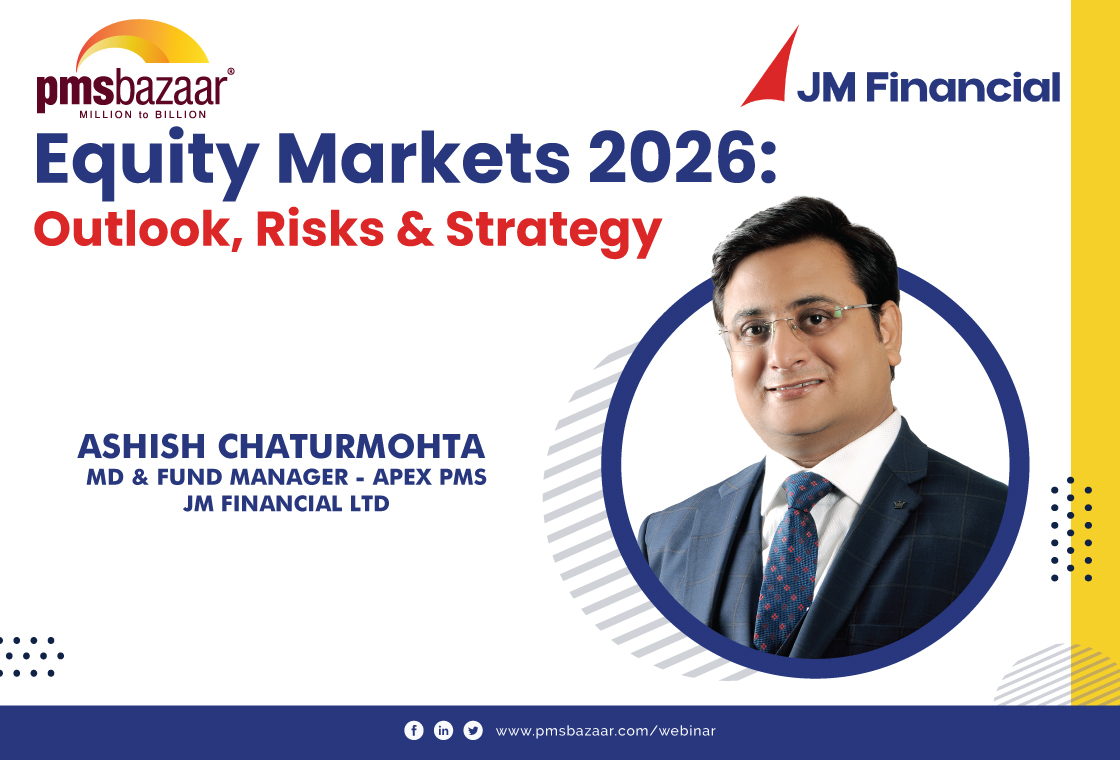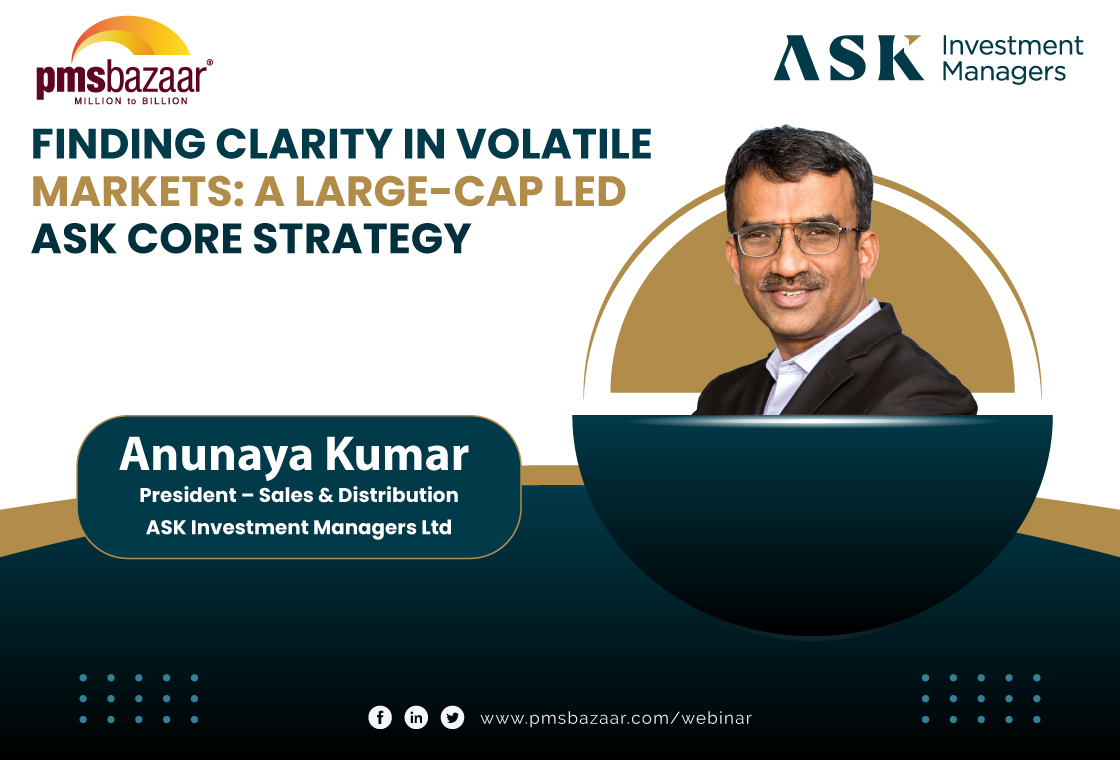PMS Bazaar conducted another episode of the Alternates Universe Webinar Series – Season 2 – Episode 10:

From Relationships to Results: Building Enduring Client Trust in Wealth Management. To shed more light on these factors, Mr. Vikas Sachdeva, Managing Director of Sundaram Alternate Assets, and Mr. Madanagopal Ramu, Head – Equities and Fund Manager, Sundaram Alternates, had an interesting discussion with Mr. Apurva Sahijwani, Managing Director and Chief Executive Officer, Avendus Wealth Management.
Excerpts from the interview
The Evolution of Trust in Wealth Management: A Conversation with Apurva Sahijwani
In an insightful conversation, Mr. Vikas Sachdeva and Mr. Madanagopal Ramu engaged Mr. Apurva Sahijwani in a discussion about the evolving landscape of wealth management, particularly focusing on trust as cornerstone of successful wealth management relationships.
Building Trust in Wealth Management
Mr. Sachdeva began by expressing his pleasure in having Mr. Sahijwani on the show, acknowledging the significant contributions he has made to the field. Mr. Sahijwani reciprocated, stating how much he was looking forward to their discussion. The conversation quickly shifted to the importance of trust, a fundamental element in the world of wealth management and life in general.
Mr. Sachdeva posed the first question, asking how the concept of trust had evolved over time in wealth management, especially among top institutions.
From Information Arbitrage to Knowledge Arbitrage
Mr. Sahijwani explained that over the past few decades, there has been a marked shift in the wealth management industry. He emphasized that this shift is best described as a transition from information arbitrage to knowledge arbitrage.
In the past, wealth managers held a distinct advantage due to their access to superior networks and earlier access to information. Mr. Sahijwani humorously pointed out that his daughter’s generation referred to this advantage as “flexing it”, essentially using exclusive information to gain clients’ trust. However, the modern landscape has drastically changed, with information now available to clients as quickly, if not quicker, than to wealth managers. For instance, the Reserve Bank of India’s bi-monthly credit policy is often shared across multiple platforms simultaneously, leaving little room for information arbitrage.
The key differentiator today, according to Mr. Sahijwani, is not the information itself but the ability to process and act on that information. Modern wealth managers must possess the skill to analyze information, assess its implications for clients portfolios, simulate potential outcomes, and offer tailored advice, this is the essence of knowledge arbitrage. This shift requires wealth managers to demonstrate a deep understanding of how external events affect client portfolios and to explain these implications in a relatable manner, ultimately fostering a strong, trusting relationship with clients.
Mr. Sachdeva summarized the point as a move from simply possessing information to focusing on the quality and application of that information.
The Impact of Commoditized Products on Wealth Management
Mr. Ramu then shifted the conversation to the issue of commoditization, asking how wealth management platforms can differentiate themselves in a world where product lifecycles are becoming increasingly compressed.
Mr. Sahijwani expressed his disagreement with the notion that all products have become commodities. While he acknowledged that certain products, such as exchange-traded funds (ETFs), are largely differentiated based on fees and tracking errors, he argued that more complex products allow for substantial differentiation. These differentiators include the experience and expertise of the investment manager, the quality of the portfolio, decision-making speed, and the ability to manage market volatility.
In a world where product offerings are increasingly commoditized, Mr. Sahijwani stressed that a wealth management platform must offer resilient and differentiated products that span various asset classes. These differentiated products, when strategically employed in portfolio construction, can weather market fluctuations, showcasing the platform’s expertise and ultimately building long-term client relationships.
Customization of Advice: A Personalized Approach to Wealth Management
Before returning the questioning to Mr. Ramu, Mr. Sachdeva expanded on the theme of commoditization by asking whether wealth management advice itself was becoming commoditized or if there was still a high degree of customization.
Mr. Sahijwani strongly emphasized that wealth management advice is becoming more personalized, not less. Reflecting on his early career, he described how asset allocation was once based on a simple formula: 100 minus a client’s age determined their equity allocation. This approach, he argued, was overly simplistic and failed to consider important factors like risk preferences, liquidity needs, and individual aspirations.
Mr. Sahijwani explained that today’s wealth managers engage in deep conversations with clients to understand their unique needs, preferences, and financial goals. This enables the creation of customized portfolios that are actively managed and regularly adjusted to reflect changing market conditions. He argued that this personalized approach to advising clients on their portfolios is crucial to building lasting relationships and fostering trust.
Critical Elements for Building Long-Term Trust
Mr. Ramu asked an important question about the key factors clients prioritize when building long-term relationships and trust with wealth management firms. He also inquired about situations where trust had been tested and later rebuilt.
Mr. Sahijwani identified several critical elements clients look for when selecting a wealth management firm. These include the firm’s capabilities, the credentials of its team, its track record, and the ability to predict the performance of asset classes, especially in volatile markets. He emphasized that agility in managing portfolios during turbulent times is vital, as well as excellent client servicing, which often goes unnoticed but is crucial for sustaining strong relationships.
He also noted the importance of referrals and word-of-mouth recommendations, especially among high-net-worth and ultra-high-net-worth clients, as a means to build trust. A solid reputation among peers helps clients feel more confident in their wealth managers.
Reflecting on trust being tested, Mr. Sahijwani shared an anecdote from the 2018 credit crisis following the IL&FS collapse. Many clients had invested in credit risk funds with higher returns but faced significant losses. Rebuilding trust after this crisis involved educating clients about the risks of different asset classes, especially credit. Over time, this education helped restore trust, and clients regained confidence in specialized credit forms like private credit.
Balancing Performance and Relationships in Volatile Markets
The conversation shifted to balancing performance delivery with relationship nurturing in volatile markets. Mr. Sachdeva inquired how wealth managers can manage both, particularly with the rise of new assets like cryptocurrency.
Mr. Sahijwani emphasized that performance and relationship building go hand in hand. He shared an example from the COVID-19 market downturn, where clients with strong relationships with their wealth managers chose to stay invested, unlike others who sought to liquidate. He also shared a story about two generations within the same family having differing views on investment decisions, highlighting the influence of generational perspectives on financial choices.
Enduring Principles in Wealth Management
Mr. Sahijwani concluded by emphasizing a few enduring principles that define successful wealth management: a client-first approach, collaboration, and patience. He explained that in today’s interconnected world, wealth managers cannot work in isolation; they must rely on a team of experts, including analysts and service professionals, to deliver the best possible experience to clients.
He also stressed that building strong client relationships takes time and patience, using the adage “Rome wasn’t built in a day” to illustrate his point. Trust, he explained, is earned through years of consistent effort, persistence, and service.
The Role of Technology in Wealth Management
As the conversation moved towards the future of wealth management, Mr. Ramu asked about the increasing role of technology, particularly AI and machine learning, in shaping the industry.
Mr. Sahijwani explained that while technology can significantly enhance the efficiency of decision-making processes and improve transparency, it cannot replace the human element in wealth management.
He stressed that AI and machine learning will likely play a pivotal role in enhancing analytical capabilities and providing data-driven insights, but they cannot replace the personal touch and deep understanding of clients’ unique needs that wealth managers provide.
Concluding Thoughts: Two Commandments of Wealth Management
To wrap up the discussion, Mr. Sachdeva asked Mr. Sahijwani to distill his extensive experience into two key commandments for building trust in wealth management. Mr. Sahijwani’s answer was succinct:
- “Thou shalt not put long-term money into short-term assets.”
- “Thou shalt not put short-term money into long-term assets.”
He emphasized that these two commandments capture the essence of wealth management: understanding the time horizon of a client’s financial goals and investing accordingly. This, he argued, is crucial in building long-term trust and ensuring that clients’ financial needs are met in a sustainable, responsible way.
Get access to rich data and analytics of PMS & AIF by subscribing to us. Join the 75000+ investors & experts: Subscribe NOW
Recent Blogs

January Rout, Extreme Dispersion: PMS Returns Swing From Losses to Gains
Benchmark falls deepened losses, but multi-asset and debt cushioned portfolios meaningfully

Investment Frameworks : A Practitioner’s Guide
PMS Bazaar recently organized a webinar titled “Investment Frameworks: A Practitioner’s Guide,” which featured Mr. Sumit Agrawal, Senior Vice President, Nuvama Asset Management Limited. This blog covers the important points shared in this insightful webinar.

Aurum Multiplier Portfolio - Where Small and Mid-Cap Alpha Meets Large-Cap Stability
PMS Bazaar recently organized a webinar titled “Aurum Multiplier Portfolio - Where Small and Mid-Cap Alpha Meets Large-Cap Stability,” which featured Mr. Sandeep Daga, MD& CIO, Nine Rivers Capital and Mr. Kunal Sabnis, Portfolio Manager, Nine Rivers Capital. This blog covers the important points shared in this insightful webinar.

Flat Markets, Wide Outcomes: How 484 PMS Strategies Performed in Dec 2025
December 2025 was a month where market returns stayed close to flat, with the Nifty 50 TRI at -0.28% and the BSE 500 TRI at -0.24%.

Equity Markets 2026: Outlook, Risks and Strategy
PMS Bazaar recently organized a webinar titled “Equity Markets 2026: Outlook, Risks and Strategy,” which featured Mr. Ashish Chaturmohta, MD & Fund Manager – APEX PMS, JM Financial Limited. This blog covers the important points shared in this insightful webinar.

MICRO CAPS: The Dark Horses of the Indian Equity Market
PMS Bazaar recently organized a webinar titled “MICRO CAPS: The Dark Horses of the Indian Equity Market,” which featured Mr. Rishi Agarwal and Mr. Adheesh Kabra, both Co-Founders and Fund Managers, Aarth AIF. This blog covers the important points shared in this insightful webinar.

Finding Clarity in Volatile Markets: A Large-Cap Led ASK CORE Strategy
PMS Bazaar recently organized a webinar titled “Finding Clarity in Volatile Markets: A Large-Cap Led ASK CORE Strategy,” which featured Mr.Anunaya Kumar, President – Sales and Distribution ASK Investment Managers Limited. This blog covers the important points shared in this insightful webinar.
.jpg)
Passively Active Investing — A Modern Investor’s Lens on ETF-Based PMS
PMS Bazaar recently organized a webinar titled “Passively Active Investing — A Modern Investor’s Lens on ETF-Based PMS,” which featured Mr. Karan Bhatia, Co-Founder and Co-Fund Manager , Pricebridge Honeycomb ETF PMs. This blog covers the important points shared in this insightful webinar.

